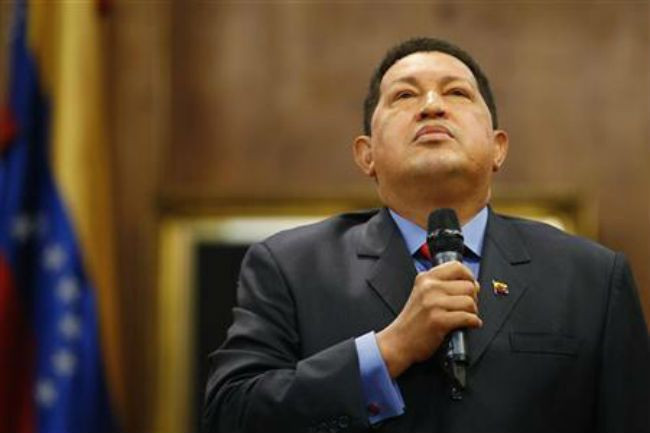
An ebullient President Hugo Chavez on Tuesday hailed his comfortable re-election as evidence of Venezuela's "perfect" democracy and mocked his foes' depiction of him as a dictator.
The long-serving socialist leader won Sunday's poll with 55 percent of the votes on record turnout of 81 percent. The result was quickly accepted by losing opposition candidate Henrique Capriles.
Chavez's election win would extend his rule to 20 years, delighting both his power base among the South American country's poor and allies from Cuba to Bolivia, who depend on his cheap oil shipments and other aid.
"Some media keep talking about Venezuela's dictatorship, the tyrant Chavez," he told reporters.
"Well we have a democracy here that has again been reaffirmed and ratified, a totally transparent, quick and efficient system ... If you want to see a vigorous, solid democracy, come to Venezuela. It was a perfect day."
The opposition has long characterized the 58-year-old Chavez as an autocrat, citing his style of government, aggressive rhetoric, tough treatment of critics at home, and friendships with authoritarian leaders around the world.
Chavez and his supporters, however, point to his dozen or so vote wins during his 14-year-rule, the devolution of power and resources to grass-roots local authorities, and his own humble background, as proof of his democratic credentials.
While there were no serious complaints about Sunday's electronic vote system, critics say the campaign was unfairly stacked in Chavez's favor due to his use of state resources and excessive use of TV time.
As is his custom after election victories, Chavez has been projecting a more moderate image, even telephoning Capriles with whom he had not spoken during the fractious campaign.
CHAVEZ FINALLY USES CAPRILES' NAME
Chavez again commended Capriles' quick acceptance of defeat, speaking his name on Tuesday for the first time after routinely insulting him as a "pig," a "loser" and a "fascist" over the past few weeks.
Capriles, the 40-year-old governor of Miranda state, ran a vigorous campaign and contrasted his youth and energy with Chavez's more subdued condition after a year of cancer treatment. Capriles had also sought to capitalize on Venezuelans' widespread weariness with crime, corruption and inefficient public services.
Capriles took 44 percent of the vote, a good showing for an opposition candidate against Chavez, but still a disappointment.
"Where there is life, there is hope," Capriles said on Twitter as he tried to cheer his devastated supporters.
Chavez won in 22 of Venezuela's 24 states, thanks to his personal chemistry with the poor, together with heavy government spending on welfare projects in the slums.
Attention is now focused on Chavez's health. Any recurrence of his cancer would dramatically change the political landscape and interfere with his plans for a new six-year term starting in January.
He has promised to deepen socialism in Venezuela, which some interpret as meaning more nationalizations are on the way, possibly in the banking, healthcare or food sectors.
Capriles, who united and galvanized the opposition as never before under Chavez, must now decide whether he will return to his job as governor of Miranda or seek some sort of national leadership role.
Having suffered his first electoral defeat in a two-decade political career, Capriles is widely expected to have another crack at the presidency, especially if ill health afflicts Chavez again in the next few years.
"He would be wise to be patient and persistent," said U.S. analyst Michael Shifter. "After all, it took Lula, now widely regarded as Latin America's premier political wizard, four attempts before he attained the Brazilian presidency," he said, referring to ex-Brazilian leader Luiz Inacio Lula da Silva.
VENEZUELA DEBT FALLS
Venezuela's widely traded sovereign debt fell on investor disappointment at Chavez's win, though losses were limited because of doubts that he is healthy enough to serve his full term.
The benchmark 2027 Global bond fell roughly 3.5 points in price on Tuesday to bid around 87.
A retired army lieutenant colonel who first came to fame with a failed 1992 coup, Chavez has become Latin America's main anti-U.S. agitator, criticizing Washington while forging relationships with its adversaries such as Syria and Iran.
Chavez sends discounted oil to more than a dozen Central and South American countries. Communist Cuba receives more than 100,000 barrels a day of crude oil in exchange for services from more than 40,000 Cuban medics and others in Venezuela.
Despite fears of violence during the election, the nation has been relatively quiet after the vote.
A small knot of protesters burned tires in one rich part of Caracas late on Monday, alleging vote fraud, but were chided by Capriles. "Radicalism did us a lot of damage (in the past), let's not succumb to that again," he said.
"We are millions and this struggle is not over."
© Thomson Reuters.




